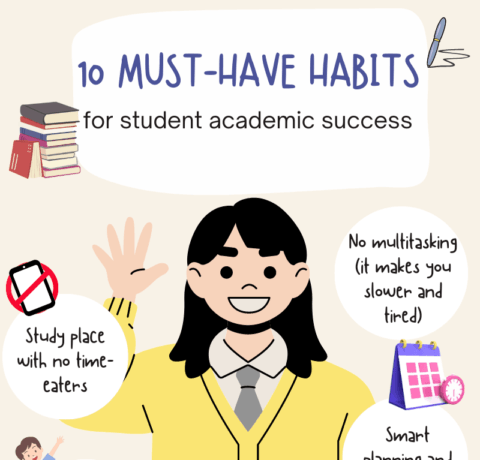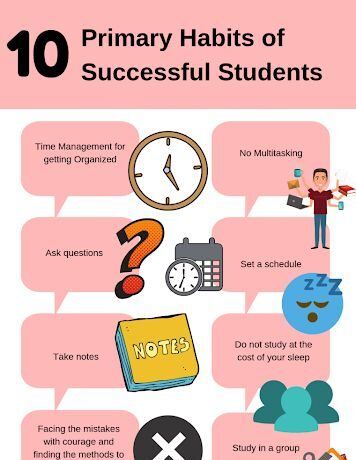15 Ways Students Can Beat Procrastination Infographic
Procrastination is definitely not students' friend. It makes students randomly search the web, watch funny youtube videos or constantly check twitter stream instead of doing things that matter. It kills their time and leads to failure. Now it's time to beat it! The 15 Ways Students Can to Beat Procrastination Infographic presents 15 efficient techniques to get rid of procrastination and be more productive!
Procrastination – Beating Techniques
As many as 1 in 5 adults (not just students!) may be chronic procrastinators. But procrastination doesn’t necessarily equal lazy. Inaction is often caused by anxiety, fear of failure or negative perfectionism. To stop the stress caused by not getting things done, try these simple, scientifically-backed, solutions:
1. Know yourself
How: Understand how procrastination affects your life. Think about the habits that often cause it.
What it helps: Insight prevents you from feeling inadequate. Helps you understand the causes of procrastination.
2. Practice Effective Time Management
How: Create estimates for completing assignments. Compare accuracy of estimates across tasks.
What it helps: Simplifies working pattern with effective planning. Improves quality of work and avoids stress.
3. Change Your Perspective
How: Think about what attracted you to your assignments. Look beyond the grades to what interests you.
What it helps: Identifying personal goals improves engagement. Reassessing an assignment makes it less intimidating.
4. Commit to Assignments
How: Lis tasks that you’re confident you will complete. Make a point of crossing each task off.
What it helps: Rebuilds faith in your own abilities. Commits to making good on promises.
5. Work in Productive Environments
How: Choose where you work and with who wisely. Don’t study in places filled with distractions. e.g. TV.
What it helps: Helps focus on the immediate task. Removes obstacles to studying.
6. Be Realistic
How: Set reasonable targets to measure achievement. Be patient, change won't come overnight.
What it helps: Avoids self-sabotage from unrealistic expectations. Unrealistic goals feed procrastination; why try the impossible?
7. Self-Talk Positively
How: Notice how you talk to yourself when procrastinating. Replace negative talk with positive.
What it helps: Stops negative thinking before it starts. Encourages you towards achieving goals.
8. Un-Schedule
How: Develop a flexible schedule that only includes important tasks. Keep plenty of time free for extracurricular activities.
What it helps: Rigid schedule can leave you feeling overwhelmed. Greater happiness from the work done.
9. Swiss-Cheese Tasks
How: Devote small chunks of time to a big task. Achieve as much as possible, without pressure.
What it helps: Tasks seem smaller with holes punched in them. Builds momentum and reduces obstacles.
10 . Don't Indulge Fantasies
How: Stop fantasizing about desired results. Instead, devise practical steps to achieve them.
What it helps: Imagination is the enemy of motivation. Viewing outcomes objectively improves working energy.
11. Plan for Obstacles
How: List possible obstacles for completing assignments. Plan countermeasures, e.g., “Whenever I look at Twitter,I go for a break”.
Why it helps: Mentally prepares you in advance. Effectively counters procrastination.
12. Improve Learning Behavior
How: Focuses less on gratification. Focus more on learning for the future.
Why it helps: Develops correct behaviors in assessing mistakes. Improve behavior in combating procrastination.
13. Help Yourself
How: Ask your roommates or family not to indulge your habit. If you mess up, deal with the consequences alone.
Why it helps: People who expect help procrastinate more. Teaches self-sufficiency and independence.
14. Reward Progress
How: Create a reward system to celebrate successful tasks. Similarly, arrange small punishments for failures.
Why it helps: Positively reinforces effort and progress. Provides incentive and drive to achieve.
15. Learn to Forgive Yourself
How: If you slip up, don't be hard on yourself. Understand that there is no quick-fix solution.
What it helps: Procrastination is often I rooted in your psychology. Forgiveness can improve future results.
Procrastination is more than putting off tasks; it’s a fear of action. The solution? Have faith in yourself, live in the present and set realistic goals you can successfully achieve.







You can adjust your cookie preferences here.